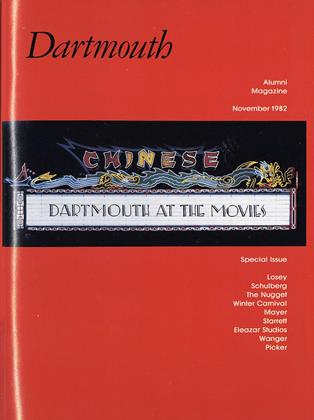"Economic peril is not obsolete," warned Lane Kirkland, speaking to an audience of 2,000 in Thompson Arena on October 4. "Neither safety nets nor sophisticated computer models render us immune from the prospect faced by the class of 1930." Kirkland, appearing as the sixth annual Class of 1930 Fellow, was making his first collegiate address since his election four years ago as president of the A.F.L.-C.I.O., the nation's largest. labor organization.
In a strong speech laced with recollections of the Great Depression, the former merchant seaman urged a partnership, among labor, management, and government. Characterizing the Reagan administration as one "guided so doggedly by myth and fallacy that it will be undone by its ,own legislative victories," Kirkland condemned its "economic mythomania" and rounded on its efforts "to suppress and dismantle the benign functions of government" and "to remove the federal presence from any substantial role save the raising of armies and overseeing the de-taxing, deregulating and unleashing of private business enterprise." The response of business, he asserted, has been "general collapse and corporate cannibalism."
"This is no time for retreat from the struggle for human betterment," he said, stressing that "urgent new challenges and tasks await the prudent and measured invocation of the federal instrument." He invoked the history of the thirties, reminding his audience that since those tragic times, "democratic government has safely steered this nation through social revolutions that no other nation has managed peacefully, or so well. From a nottoo-distant day of local lynch law and a pattern of racial apartheid as brutal as that of South Africa, we have approached the goal of full and equal rights and opportunities. The American people should be proud, rather than contemptuous, of the role of their government in that achievement."
Kirkland recommended reconstruction and modernization of the broad industrial base of this country, a task, he said, that requires the cooperation of labor, management, and government, and without which we cannot hope "to preserve a measure of independence from coercion by foreign cartels and offer our youth brighter prospects than employment in the servicing of electronic games or the dispensing of junk food."
He went on to scotch the persistent legend that Samuel Gompers, founder of the A.F.L., had once replied to the question of what labor wanted with a simple, "More!" A recently completed study of all of Gompers' papers, he reported, has found no evidence that the late labor leader
ever gave such an answer to such a question. Gompers' response, made in 1893, was, in fact,, neither cynical nor abrupt, explained Kirkland, who quoted his predecessor's actual words: "What does labor want? We want more school houses and less jails, more books and less arsenals, more learning and less vice, more constant work and less crime, more leisure and less greed, more justice and less revenge." On that poignant and pointed note, Kirkland concluded to thundering applause.
A.F.L.-C.I.O. president Lane Kirklandbrought to campus a plea for higher ideals thanelectronic games and junk food.
My object has been to keep my own temper & make everybody else angry. There is a kind of secret biting satire, where the author is at his ease & seems to say only what he is compelled to say, but yet like a soft secret gas it penetrates the very bones." Elijah Parish to John Wheelock, 1814
 View Full Issue
View Full Issue
More From This Issue
-
 Feature
FeatureThe Credits
November 1982 By Rob Eshman '82 -
 Feature
FeatureThe Hollywood Connection
November 1982 By Maury Rapf '35 -
 Feature
FeatureEvaluating Kitsch
November 1982 By Alan Gaylord -
 Feature
FeatureHelping Sammy Run
November 1982 -
 Feature
FeatureThe Camera Man
November 1982 By James Farley '42 -
 Feature
FeatureThe West That Wasn't
November 1982 By R.E.
Article
-
 Article
ArticleCAMPUS NOTES
June 1917 -
 Article
Article$660,000 Alumni Fund in Sight
July 1953 -
 Article
ArticleNATIONAL AWARD
OCTOBER 1964 -
 Article
ArticleThe annual Harvard-Dartmouth
By HOMER EATON KEYES -
 Article
ArticleTHE STORY OF DARTMOUTH
December, 1914 By Wilder Dwight Quint, J. K. LORD -
 Article
ArticleThe Faculty
JANUARY 1970 By WILLIAM R. MEYER

